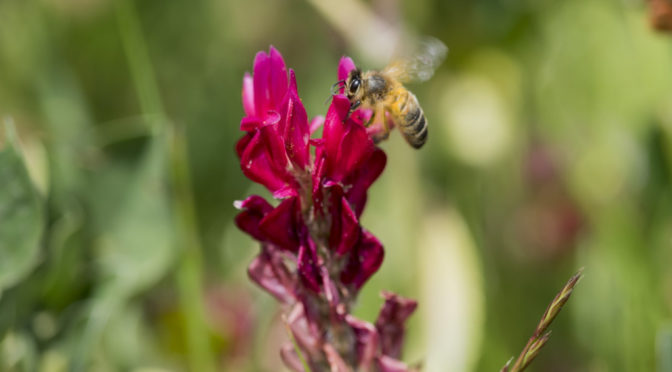Views: 277
Thursday, 20 May, was World Bee Day. The purpose of this international day is for acknowledging that bees and pollinators in general, are fundamental to our survival and that we are not taking care of them. As a result, half the number of insect species has fallen alarmingly and a third is already considered in danger of extinction.
The main cause of this marked decrease is the way in which the largest part of the food we eat is produced by intensive farming that generally uses synthetic pesticides and fertilizers. For that reason, GOB Menorca has joined more than 140 entities to promote an European Citizen’s Initiative (ECI) for saving bees and farmers. (https://www.savebeesandfarmers.eu)
This ECI is urging the European Union to eliminate synthetic pesticides, progressively, before 2035, starting with the most dangerous. With this in mind, GOB has written to the Minister of Ecological Transition and Demographic Challenge, Teresa Ribera, and to the Minister of Agriculture, Fisheries and Food, Luis Planas, asking them for Spain to support the prohibition of the sulfoxaflor, benfluarina and cypermethrin pesticides.
The use of pesticides has been identified as the principal cause for the mass extinction of insects. It is important to note that insects provide essential ecological services for our survival, which include pollination. Without this natural process, many cultivated and wild plants would not be able to survive. It is essential as much for ensuring crops as for conserving biodiversity. There are many alternatives for the natural control of pests. With the Land Stewardship Scheme, we are working with professional farmers to achieve these methods.
The second point of ECI is to urge the European Union to restore biodiversity to agricultural areas. The destruction of habitats, along with the use of synthetic pesticides and fertilizers, are the principal features of intensive farming and are the main causes of the world decrease in insect populations.
This is why it is vital to keep natural spaces of cultivated land, as is so well represented in the mosaic of Menorcan agriculture: small woodland areas, dry-stone walling intertwining, among others, the vegetation and wetland areas, alternating with cultivated areas. As well as the traditional practices such as crop rotation is the preservation of parts of the farm keeping them for flowers and wildlife.
The third ECI point is to ask that the European Union, and especially its Common Agricultural Policy, gives priority to small-scale, diverse and sustainable farming, and supports the transformation of farming methods towards ecological and agroecosystems. This is, in fact, what is being done here in Menorca through the Land Stewardship Scheme: accompanying those farmers who are committed to agricultural management while preserving environmental biodiversity, at the same time as making it economically viable.
On behalf of World Bee Day we invite you to do two things. The first is to sign the ECI at Save Bees and farmers . The second and most essential is that you rethink food consumption, realising the impact it has on biodiversity. Through the Land Stewardship Scheme website you can find farmers who produce food that conserves the natural environment.

